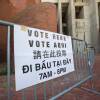As the Democratic candidates for lieutenant governor squared off in their first televised debate, all three tried to overcome the perceived obscurity of the position, arguing that they would make a difference in the office.
Eric Lesser, Kim Driscoll and Tami Gouveia all admitted that not many people know what the lieutenant governor does. They also agreed that most people do not know the role of the Governor's Council — a body that the lieutenant governor oversees and which votes on judicial nominees and considers pardons and commutations. But all three candidates argued they would make a difference in the role if elected.
“We often refer to [the Governor’s Council] as the most important state commission you never heard of,” said Driscoll, who has served as mayor of Salem since 2006. “I hope to be in a position to not only chair that group, but bring openness and transparency."
State Sen. Lesser said he is "uniquely situated to reinvigorate" the Governor's Council because of his prior work as an attorney, vice chair of the state Senate Judiciary Committee and work on Supreme Court nominations.
“We need more diversity on our bench in Massachusetts," he said, "and we need to work to recruit and help very good, talented candidates make it through that gauntlet of the Governor’s Council, because it is a gauntlet.”
State Rep. Gouveia also said she would focus on transparency as well as ensuring diversity among parole board judges. Drawing on her experience as a social worker, she emphasized the importance of making sure those judges "really understand the role of childhood trauma … systemic racism and intergenerational poverty.”
When the candidates were asked whether they could name all the current members of the Governor’s Council, Driscoll said she “certainly” could. Lesser and Gouveia, however, admitted that they could not name all eight people. And despite the fact that Governor’s Council meetings are open to the public, all three candidates told Greater Boston host Jim Braude that they have rarely attended meetings.
Lesser, Gouveia and Driscoll were cordial and agreed on many topics throughout the debate, but they differed on ideas to fix the MTBA.
While Gouveia and Driscoll said fixing the beleaguered T is a matter of funding, Lesser said it has nothing to do with money.
"We need to make sure that there is a culture of safety at the T. This isn't a money issue. The Legislature has written every check to Gov. Baker that he's asked for. This is a culture and management issue," Lesser said.
Gouveia said the T is "literally crashing and burning almost every single week. It's not always safe. It's not always reliable." She added that the MBTA needs greater investment, which could potentially be a benefit of a proposed tax on the state's highest earners.
Driscoll said the T is a "total mess" and added that the state needs to expand public transit and electrify lines. Lesser said her answer wasn't specific enough.
All of the candidates tied themselves closely to Healey, and said they would handle conflict with her openly.
Watch the debate:





